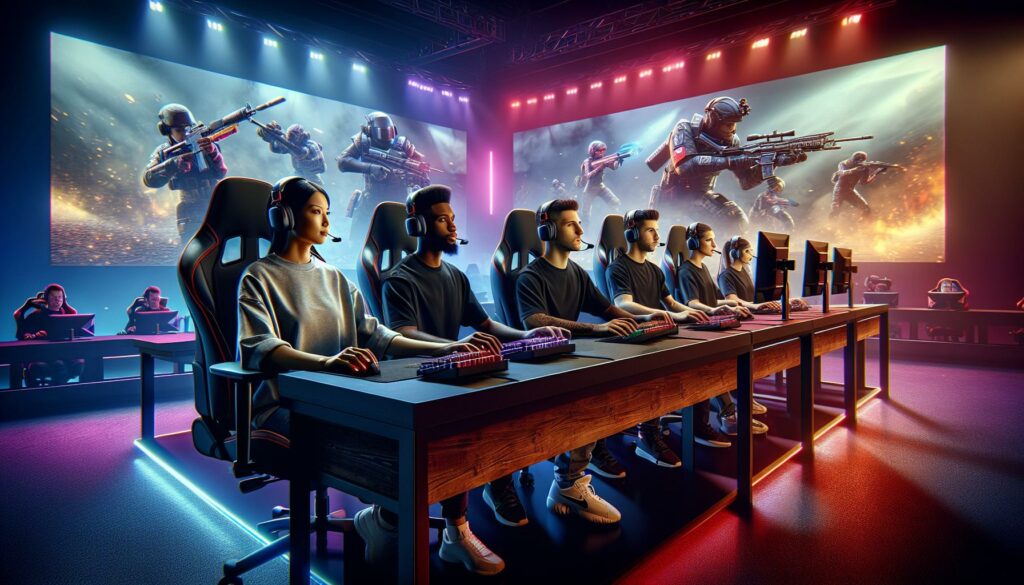Video gaming has exploded in popularity, captivating millions around the globe. As I dive into this digital realm, I often find myself questioning whether gaming can truly be classified as a sport. With competitive tournaments drawing massive audiences and players training rigorously, the lines between traditional sports and gaming are increasingly blurred.
In this article, I’ll explore the arguments for and against viewing video gaming as a sport. From the skills required to succeed to the physical and mental demands placed on players, it’s a topic that sparks lively debate. So, let’s unpack this fascinating intersection of technology and competition together.
Key Takeaways
- Definition of Sport: Understanding whether video gaming qualifies as a sport depends on characteristics like physical activity, competition, and skill development.
- Skills Required: Both video gaming and traditional sports require significant skill development, including reflexes, hand-eye coordination, and strategic thinking, showcasing rigorous training comparable to athletes.
- Competitive Nature: E-sports feature organized competitions with structured formats, similarly to traditional sports, attracting substantial viewership and participation, thus enhancing its legitimacy as a competitive activity.
- Physicality Debate: Critics argue that the lack of physical exertion in video gaming distinguishes it from traditional sports, pointing out the health benefits associated with physical activities.
- Evolving Perceptions: The growing acceptance of esports in mainstream culture, along with institutional support like college programs, suggests an evolving relationship between video gaming and sports.
- Technological Integration: Future advancements, such as virtual reality and sports league collaborations, may further blur the lines between traditional sports and esports, leading to increased recognition for video gaming in the sports realm.
Is Video Gaming a Sport
Video gaming has evolved into a multi-billion dollar industry, boasting millions of players globally. Various genres exist, including action, strategy, role-playing, and sports games, appealing to diverse audiences. Competitive gaming, or esports, has surged, drawing substantial viewership and participation rates.
Gamers engage in tournaments, showcasing their skills and strategies. Major events often offer significant cash prizes, with tournaments such as “”The International”” for Dota 2 or the “”League of Legends World Championship”” attracting thousands of spectators each year.
Training for these competitive events resembles traditional sports, involving long hours of practice, performance analysis, and teamwork. Players develop reflexes, hand-eye coordination, and strategic thinking to excel. Organizations support gamers, providing coaching, sponsorship, and resources.
The debate about video gaming as a sport hinges on definitions of sports and the physicality involved. While gaming lacks the physical endurance typical in traditional sports, the mental acuity and quick decision-making required for success merit consideration. Engaging in video gaming necessitates commitment and represents a modern form of competition.
Defining Sports
Defining what constitutes a sport involves examining various characteristics that differentiate traditional sports from other competitive activities. Understanding these elements can clarify whether video gaming fits into the sports category.
Traditional Sports Characteristics
- Physical Activity: Traditional sports require physical exertion and skill, often involving athleticism and bodily coordination. Examples include running in track events or lifting in weightlifting.
- Competition: In traditional sports, a competitive environment exists where individuals or teams strive to win against opponents. Tournaments and leagues create structured events.
- Rules and Regulations: Established rules govern gameplay and ensure fairness. Sports organizations set these regulations, like the NFL for football or FIFA for soccer.
- Skill Development: Athletes undergo significant training to refine their skills. This training includes techniques, strategies, and physical conditioning to perform at high levels.
- Spectatorship: Traditional sports attract fans who watch games in person or through various media platforms. This aspect generates a sense of community and a shared experience.
- Competitive Environment: E-sports involve organized competitions, often featuring teams or players vying for championship titles. Event structures mirror those of traditional sports.
- Skill and Strategy: Players develop unique skills and strategies specific to their games, just as athletes train for their respective sports. Quick reflexes and tactical decision-making are crucial.
- Digital Platforms: E-sports predominantly occur on digital platforms, utilizing computers and consoles. This medium creates a distinct experience compared to physical sports.
- Team Dynamics: Many e-sports involve teams working collaboratively, similar to traditional team sports. Coordination and communication among players enhance overall performance.
- Audience Engagement: E-sports attract a growing number of viewers, with millions tuning in to watch matches online or at live events. The fan base continues to expand, emphasizing community involvement.
By analyzing the characteristics of traditional sports and e-sports, I gain insight into the complexities of defining sports in the modern context.
Arguments For Video Gaming As A Sport
Video gaming’s classification as a sport finds support in several compelling arguments. These arguments emphasize skill development and the competitive nature of gaming, aligning it closely with traditional sports.
Skill Development
Skill development in video gaming parallels that in traditional sports. Players enhance reflexes, hand-eye coordination, and strategic thinking while mastering complex game mechanics. High-level gamers dedicate hours to practice, just like athletes, focusing on improving specific skills and techniques. Rigorous training regimens include performance analysis and full gameplay reviews, emphasizing continuous improvement. Moreover, communication and teamwork are vital in team-based games, reinforcing collaborative skills that translate to other competitive environments.
Competitive Nature
The competitive nature of video gaming mirrors that of established sports. Esports includes tournaments that attract thousands of participants and millions of viewers, similar to traditional sports events. Competitive gaming offers a structured format with rules and regulations, requiring players to adapt strategies in high-pressure situations. Players face off in various genres, showcasing their talent and consistency across multiple matches. The existence of major sponsorships, media coverage, and enthusiastic fan bases underscores its legitimacy as a competition.
Arguments Against Video Gaming As A Sport
Discussions around video gaming often highlight opposing views regarding its classification as a sport. Key arguments focus on physical activity and perception issues.
Physical Activity
Critics point out the lack of traditional physical activity in video gaming. While esports players engage in mental and strategic challenges, they don’t perform the same level of aerobic exertion typical in sports such as soccer or basketball. Research indicates that traditional sports enhance cardiovascular health and muscle strength, elements largely absent in gaming. For example, competitive basketball demands sprinting and jumping, whereas gamers typically remain seated for extended periods, which can lead to sedentary lifestyles. This fundamental difference highlights why many consider physicality essential for sports classification.
Perception Issues
Public perception also plays a significant role in the debate. Gaming often invokes stereotypes of inactivity and isolating behavior, diverging from the camaraderie and teamwork seen in traditional sports. For instance, while athletes train together, fostering team spirit and social interaction, gamers might experience solitary gameplay, limiting that sense of community. Furthermore, traditional sports have established cultural significance, with long-standing histories and recognition in educational institutions, which can overshadow the legitimacy of video gaming as a sport. Such issues contribute to skepticism regarding the classification of esports as sports, reinforcing the divide between perceived sporting activities and gaming.
Hybrid Perspectives
The debate surrounding video gaming as a sport includes perspectives on emerging trends and the future of gaming in the sports landscape. Both aspects illustrate the evolving relationship between technology and competition.
Emerging Trends
Emerging trends in video gaming reflect a growing acceptance of esports in mainstream culture. Increasing viewership of competitive gaming events showcases significant audience engagement, with millions tuning in for tournaments like “”Fortnite World Cup”” and “”Overwatch League.”” Colleges and universities are launching esports programs, offering scholarships and building competitive teams. This institutional support signals a changing perception and establishes gaming as a viable career path, akin to traditional sports. Furthermore, partnerships between gaming companies and sports organizations pave the way for cross-promotion and increased visibility. For instance, collaborations with the NFL and NBA promote interest in esports through promotional events and tournaments. These trends demonstrate that video gaming is gaining traction and recognition, blurring the lines between traditional sports and esports.
Future of Video Gaming in Sports
The future of video gaming in sports appears promising, with potential expansions into various domains. Integration of virtual reality (VR) and augmented reality (AR) in gaming is shaping new experiences, creating immersive environments for players and viewers. These technologies can enhance training and simulate real-world conditions, paralleling traditional athletic training methods. Additionally, major sports leagues are exploring ways to incorporate esports elements into their structures, such as hybrid events that combine traditional sports with gaming competitions. This integration fosters a broader audience and creates new fan engagement opportunities. Advancements in technology, societal acceptance, and the ongoing evolution of competitive gaming ecosystems suggest that video gaming will continue to influence the sports landscape, potentially leading to an era where esports achieves equal recognition alongside traditional sports.
Competitive Nature
The debate over whether video gaming qualifies as a sport is far from settled. As I’ve explored the competitive nature of esports and the skills required for success, it’s clear that gaming demands a level of dedication and strategy similar to traditional sports.
The growing acceptance of esports in mainstream culture and the emergence of collegiate programs indicate a shift in how we view competitive gaming. While some may argue against its classification due to the lack of physical exertion, the mental acuity and teamwork involved cannot be overlooked.
As technology continues to evolve, I believe video gaming will carve out its rightful place in the sports arena, blending the lines between digital competition and traditional athleticism. The future looks bright for gamers and fans alike.

